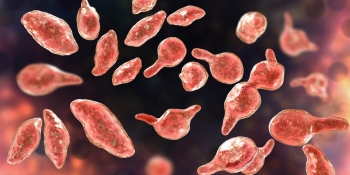
During the 1980s, scientists recognized mycoplasma genitalium (mahy-koh-plaz-muh jen-nee-tae-lee-um) as a bacterial sexually transmitted infection (STI). To put it simply, mycoplasma genitalium, also known as MG, is a form of bacteria that one can get through sexual activities. This STI is also fairly prevalent, affecting approximately 1% of the U.S. population. In other words, 1 out of 100 people have it. To put that into perspective, about 2% of people have green eyes. Take a moment to think about the people around you. How uncommon are green eyes?
Though it has been around for decades, scientists currently believe that mycoplasma genitalium has the potential to become a superbug. If you are currently sexually active, it is important to know how an STI superbug can affect you. This article will explain exactly what MG is, its prevalence, and what you can do to keep yourself safe. So, let’s keep things simple and go over certain terms.
What Are Superbugs?
Before explaining what superbugs are, we need to define other terms first. An infection is when foreign entities enter and reproduce in your body. These entities can be bacteria (e.g., syphilis), viruses (e.g., herpes), or fungi (e.g., ringworm). However, an infection becomes a disease once the foreign entities begin attacking and causing harm to the body. All diseases are infections, but not all infections become diseases. It’s the main reason why health and sex professionals use “STI” over “STD (sexually transmitted disease).” Nevertheless, there are many forms of infection, with bacteria being the most common. To combat this, doctors often prescribe anti-biotics: medicine specifically made to eradicate bacterial infection and disease. Though anti-biotics have been extremely effective, bacteria have grown stronger and resistant to anti-biotics over the years. This has resulted in superbugs: strains of bacteria that are exceedingly difficult to eradicate. In a way, superbugs are an example of survival of the fittest; the strong bacteria get to reproduce, while the weaker ones die off. Because it’s a bacterial STI, the same process is happening with mycoplasma genitalium. So, if mycoplasma genitalium may become a superbug, why is this a problem?
Why it May Be a Problem.
Bacterial infections require anti-biotics to treat. However, superbugs are highly resistant to this standard form of intervention. Therefore, if a person contracts mycoplasma genitalium, it may be become exceedingly difficult to treat in the future. However, there is another concern with mycoplasma genitalium: a standard STI test does not include MG. Due to its nature, MG requires very specific and sophisticated tests to assess. Additionally, it has high comorbidity with other STIs, making it difficult to isolate. Because of all of this, a person specifically has to ask their doctor to have this STI tested. This means that people can transmit mycoplasma genitalium to another person without even knowing that they have the STI. If you do have MG and haven’t been tested for it, you’ll eventually notice certain symptoms.
What are The Symptoms?
Regarding symptoms, mycoplasma genitalium affects men and women differently. For women, there can be pain and bleeding during and after sex, unusual discharge from the vagina, and chronic pelvic pain. Some scientists argue that mycoplasma genitalium can also inflame the uterus, and if left untreated, it can lead to permanent infertility. For men, there can be unusual discharge from the urethra, and pain during urination. No matter who you are, the symptoms of are not pleasant. Therefore, what can you do to protect yourself?
How to Protect Yourself
As you have probably guessed, one of the best ways to protect yourself from mycoplasma genitalium is to use barrier contraceptives. Barrier contraceptives include the external condom, the internal condom, and dental dams. The use of barrier contraceptives during anal, vaginal and oral sex will significantly reduce your chances of contracting or transmitting mycoplasma genitalium. To clarify, it’s completely fine to have sex without a barrier if you know everyone does not have an STI. However, knowing is not the same as assuming. Make sure that you and your sexual partners have been tested for mycoplasma genitalium, as well as all sexually transmitted infections.
Is It All Bad?
After reading this article, it is easy to think that mycoplasma genitalium is a horrible STI that is going to become untreatable in the future. Though mycoplasma genitalium, like all STIs, is a concern, there are still things that you can do to be safe. Learn your and your partners’ STI status by specifically being tested for mycoplasma genitalium. If you don’t know your partners’ STI status, make sure you utilize barrier contraceptives. After all, one way to halt the evolution of MG is to simply prevent its transmission. To be clear, the goal of this article is for you to be alert, not alarmed. The former allows you to make informed decisions for your safety, while the latter does not. Though mycoplasma genitalium has become more resilient over the years, preventative measures can still keep you safe.













